September Be A Voice Advocacy Toolkit Focuses on Health Care Access
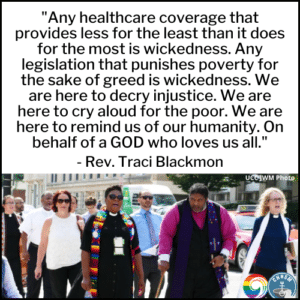
In the quest to provide medical and community health services in their local areas, many CHHSM members are on the front lines of helping people shut out of normal avenues to health care access. One example is Chicago, where UCC-related Advocate Aurora Health partners with other area faith-based organizations in the Avondale Faith and Health Collaborative. Named for a specific Chicago neighborhood, the program helps clients gain access not only to wellness classes, new parent classes, and medical care, but also to the social determinants of health: food, shelter, and clothing.
The latest edition of the Be A Voice Health and Human Service Advocacy Toolkit, produced by CHHSM and the UCC’s D.C.-based Justice and Witness Ministries, highlights the work done by the collaborative, as well as other CHHSM organizations. The installment, Health Care Access, examines several CHHSM agency programs in the context of the historical and current advocacy being done to serve at-risk communities.
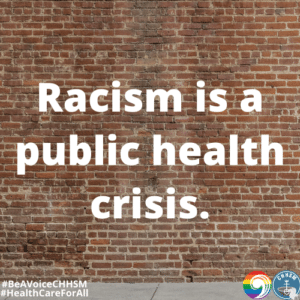
One reason Advocate Aurora has such a strong commitment to health equity is because the Chicago area has the largest life expectancy gap in the country. For example, life expectancy for residents of the Streeterville community is 90, whereas Englewood — just nine miles away — has a life expectancy of 60. Bonnie Condon — Advocate Aurora’s vice president of community health, community relations, and faith outreach — calls that unacceptable. “Every man, woman and child deserve the chance to live a long and healthy life, regardless of where they live.”
The Health Care Access volume of the toolkit also discusses the impact and role of societal racism on health care access. Racist policies and beliefs continue to impact access disparities for persons of color. For example, Black Americans are considerably less likely to receive medical care when needed — and when they do, they are more likely to receive a substandard quality of care. Research shows that these disparities cut across socio-economic lines.
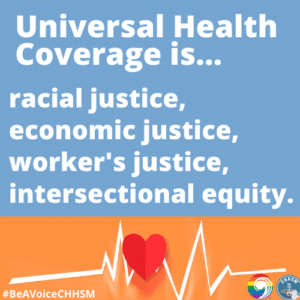
The faith-based response to health care access for all is ongoing. For more than 40 years, the United Church of Christ has advocated for health care as a human right and priority for all people. Through Synod resolutions, work on the Washington Interreligious Staff Community, and advocating directly in the Capitol, the UCC vision to create a just world for all continues.
This advocacy also has “boots on the ground,” as is evidenced through the work of such direct service CHHSM members as St. Louis’ Deaconess Nurse Ministry, iFM Community Medicine, and Deaconess Foundation, among many other UCC-related agencies. Deaconess Nurse Ministry, for example, has partnered for years with St. Louis’ Salam Clinic, a free clinic founded by Muslim Community Services with locations in key areas of St. Louis. The clinic provides care to uninsured and under-insured residents, regardless of religious affiliation. UCC congregations host two of the clinic’s locations.
The latest section of the toolkit also assists users in framing important health care access questions for candidates running for political office by providing much needed insight into current legislation and actions. The questions focus on having candidates spell out what equitable health care access means and how to protect it.
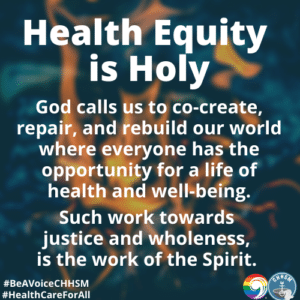
One toolkit focus is the recently implemented work requirements for Medicaid, which negatively impact people with medical issues who need Medicaid. As the toolkit points out, the requirements widen the racial disparities to health care access. Katie Adams, the UCC’s policy advocate for domestic issues, notes, “Here’s the thing: work requirements are inherently racist, their implementation and implication stemming from a white supremacist justification for slavery.”
In examining current context, the toolkit also looks at the impact a loss of the Affordable Care Act would have on millions of U.S. citizens. It is estimated that were the ACA to be repealed, nearly 30 million people would lose their insurance and health care access immediately. Protections for costly medical care and pre-existing conditions would end, with no current legislative plan for replacement.
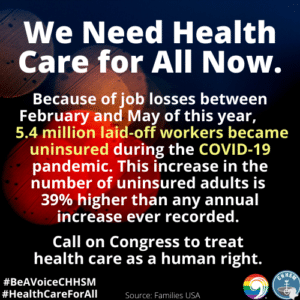
The Be A Voice Health and Human Service Advocacy Toolkit also includes definitions of widely-used health care justice terminology, as well as a list of web links to programs, articles, organizations, and worship materials. A special section of resources on the spread of COVID-19 and its impact on health care access also is included.
“When the CHHSM board chose the ‘Be a Voice’ advocacy issues, there is no way anyone could have predicted that we would be writing an advocacy toolkit in the midst of a global pandemic,” says the Rev. Elyse Berry, D.Min., Associate for Advocacy and Leadership Development. “And yet, naming health care access as well as social determinants of health could not have been more timely and more accurate in highlighting their importance. As a recent study we cite in the toolkit reports, over 5 million American workers lost health insurance this year due COVID-19 related job loss. That number is astounding and is 39 percent higher than any annual increase in the number of uninsured adults ever recorded.
“This is why when we discuss health care access, we can’t just talk about how many people have insurance, but how stable and consistent is that insurance? How comprehensive is that insurance and how far does it reach in terms of covered providers and across state lines? When our system is set up in such a patchwork way, these are the types of questions that leave us wanting for better answers; and these are the types of answers that lead to disparities in illness and death.”
The advocacy section of CHHSM’s website includes both the in-depth toolkit sections and useful, one-page topic summaries with questions.
Join Our Mailing LIst
"*" indicates required fields
Follow on Facebook
Pension Boards appoints David A. Klassen as its President, CEO - United Church of Christ
www.ucc.org
The Pension Boards, an affiliated ministry of the United Church of Christ recently announced its appointment of David A. Klassen as its next President and